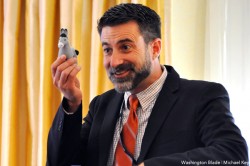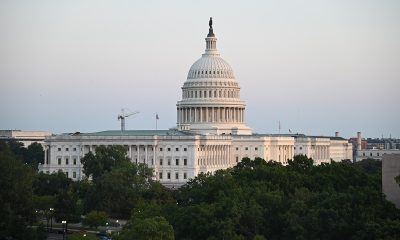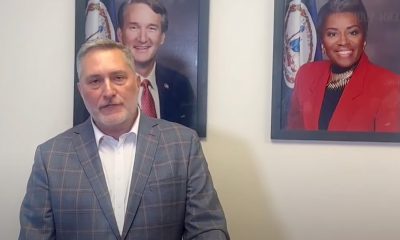National
Will Dems embrace marriage in platform?
Renewed debate over LGBT issues as parties prepare for 2012 conventions


Im sure that the Democratic Party platform will be very good if not great on LGBT issues,' said Michael Mitchell, executive director of the National Stonewall Democrats. (Washington Blade file photo by Michael Key)
The Republican National Convention in Tampa Bay, Fla., and the Democratic National Convention in Charlotte, N.C., are 13 months away, but many are already wondering how the two parties will address LGBT issues in their 2012 platforms.
“The platform from 2008 was a pretty good platform, as are most of the platforms of state Democratic parties around the country,” said Michael Mitchell, executive director of the National Stonewall Democrats. “So the vast majority of them are very LGBT inclusive, the vast majority of them talk about everything from the repeal of ‘Don’t Ask, Don’t Tell,’ all the way up to and including marriage in some places. Certainly they vary state to state, given how strong LGBT people are organized in the Democratic Party there.”
Mitchell continued, “So I have no doubt given the people who were involved in 2008 will continue to be involved now, the new crop of people we have coming in. The work that we’re doing at National Stonewall — or rather that we will be doing, as we haven’t started working in earnest on a platform — I’m sure that the platform will be very good if not great on LGBT issues.”
Mitchell sees opportunities to address new LGBT issues in the platform, as several of the 2008 planks have been achieved, including passage of a federal hate crimes law and repeal of “Don’t Ask, Don’t Tell.”
“Our issues have shifted since 2008, so obviously we had the repeal of ‘Don’t Ask, Don’t Tell’ and that’s great … but there are other issues around that implementation that we have to start digging into,” Mitchell continued. “I think it’s certainly better than what the other party is up to.”
The 2008 Republican Party platform denounced same-sex marriage, as well as non-discrimination statutes barring bias on the basis of sexual orientation or gender identity in areas like employment, public accommodations and adoption.
Some moderate Republicans hope that the party will soften its anti-gay rhetoric next year, as public opinion on LGBT issues has shifted.
The DNC’s 2008 platform included a call to repeal “Don’t Ask, Don’t Tell,” increase funding for HIV/AIDS prevention and care, pass the Local Law Enforcement Hate Crimes Prevention Act and assure that federal funds would not be used to “proselytize or discriminate” in “faith-based” programs. The language also explicitly promised to fight discrimination based on sexual orientation and gender identity, and alluded to support for non-discrimination laws in employment.
Most strikingly, the platform stated, “We support the full inclusion of all families, including same-sex couples, in the life of our nation, and support equal responsibility, benefits, and protections. We will enact a comprehensive bipartisan employment non-discrimination act. We oppose the Defense of Marriage Act and all attempts to use this issue to divide us.”
But some LGBT Democrats are looking for more in 2012.
Richard Socarides, president of Equality Matters and a former adviser to President Bill Clinton, wants to see the Democratic Party take a bold stance on issues dear to the LGBT community, including marriage equality.
“I feel it’s important for the Democratic Party to have a strong pro-LGBT platform,” he said. “The platform is very important. It reflects what we stand for. The 2008 platform is not going to be good enough for 2012.
“As we watch the Republican field develop, it seems the GOP platform will be a total disaster,” Socarides said, referring to the 2012 field of GOP presidential candidates.
Members of both parties, however, see 2012 as an opportunity to make headway.
“Log Cabin Republicans plan to actively participate in the process to revise the party’s platform,” said Christian Berle, deputy executive director of Log Cabin Republicans. “We recognize there will be a lot of work to be done to strengthen the importance of reaching out to LGBT Americans as a part of strengthening the party,”
Log Cabin’s chairman emeritus, Bob Kabel, sits on the Republican National Committee, Berle noted. Kabel — Log Cabin’s first national chairman — is the only openly gay member of the RNC, and the first openly gay chairman of a state-level Republican Committee, as the chairman of the District of Columbia Republican Committee.
“Log Cabin Republicans have long had delegates of ours to the conventions and will work with other organizations to help us recruit more openly gay candidates,” Berle said.
Mitchell hopes to bring leaders from across the LGBT community directly to the DNC to communicate goals and ideas to the decision makers.
“I would hope that we are the point organization for other LGBT organizations who are looking to get included in the platform and that we can help guide people to the right folks. That’s the role I really see us as playing.”
Though both parties have a long wait to decide their platforms, Michael Czin, a regional press secretary at the Democratic National Committee, said that as soon as the state parties are ready, the process will begin moving forward.
“The process to draft the 2012 platform hasn’t started yet, but next year there will be a robust and inclusive process within the Democratic Party to draft the 2012 platform,” Czin told the Blade. “The process, just like in previous years will be representative of the many voices that comprise the Democratic Party.”
The platform is forged by the Platform Committee, a diverse group that consists of party delegates from all over the country, representing many constituency groups within the party.
Mitchell said that Stonewall would be able to wield some influence over the process of crafting the platform, especially if prominent LGBT Democrats are involved at high levels during its creation.
“[Stonewall Democrats] have close relationships with the folks who I expect will end up being players,” Mitchell said. “The folks who were all involved the last time around. … We have a lot of those relationships already existing, and I’m sure we’ll be building relationships to figure out the best way to make the platform as LGBT inclusive as possible for both the LGBT community and our families.”
Berle sees a trend of Republican candidates taking less hard-right stances on LGBT issues.
“I think the candidacy of Gov. Jon Huntsman opens a great number of doors for LGBT Republicans to get behind a candidate,” Berle told the Blade. “He has the same position on marriage equality that the president does with his support for civil unions, that is striking a tenor with a wide array of gay and lesbian Americans, not only Republicans but Democrats and independents as well. You have an openly gay candidate in Fred Karger and you have Gov. Gary Johnson and Rep. Ron Paul, whose libertarian positions line up with the views of many LGBT Americans.”
But not everyone sees platform language as relevant to the race, as candidates don’t always tow the party line.
“Party platforms are interesting creatures these days,” said Dana Beyer, executive director of Gender Rights Maryland. “There’s a real dichotomy in my mind. I can’t remember the last time I cared, as a voter, what the platform actually said. Maybe the early 70’s, but it was so long ago I don’t recall.”
She continued, “However, as an activist, and a Democratic candidate, I’m very aware that the platform speaks volumes about the party’s values and priorities. And while it is still a long haul from the enunciation of those values in a platform to their integration into the life of the party’s members, and particularly its leaders, you must start somewhere, and that somewhere is the party platform.”
Chris Barron, board chair of GOProud, played down the importance of platform language.
“Political party platforms are not worth the paper that they’re printed on,” said Barron. “No one in the country reads them, nor should anyone in the country read them. They have absolutely no impact whatsoever. What I care about? I care about the policies that the nominee of each party is going to put forward. That’s what [GOProud will] be focused on.”
Log Cabin’s Berle agrees the presidential nominee holds more sway than the platform committee in the end.
“In terms of the platform — and the convention itself — it will be driven largely through whoever is the Republican nominee, so there are a varying number of candidates who would have different positions in regard to redressing those issues,” Berle said.
Berle speculated that if one of the candidates who has committed to supporting a federal marriage amendment wins the nomination, it will remain part of the platform. However, there are other areas where LGBT Republicans can gain ground, he said.
“It would be a consistent effort of ours to address and debate and hopefully remove the language in support of the ‘Don’t Ask, Don’t Tell’ policy as a part of the platform, particularly because ‘Don’t Ask, Don’t Tell’ in August of 2012 will not exist as a policy,” Berle said. “And it will not exist as a policy because of the support of Republican United States Senators such as Susan Collins and Scott Brown.”
Berle noted that there could be opportunities at the convention level that would expand rights for LGBT Americans, such as support for tax parity legislation that removes the penalty on companies and individuals that cover domestic partners through their health care policies.
When speculating about whether or not the Republican Party would finally nominate a candidate that would speak against anti-LGBT voices in the party, GOProud’s Barron said the party already had in John McCain.
“John McCain went to the floor of the Senate and spoke out eloquently against the Federal Marriage Amendment back when that voice actually mattered,” Barron said. “When there were centrist Democrats who were hiding from this issue, John McCain went to the floor and talked about how it is antithetical to everything that the Republican Party was founded on.”
McCain, however, frustrated his pro-LGBT friends in the Republican Party in 2010 when he became the most outspoken voice fighting the repeal of “Don’t Ask, Don’t Tell” in the Senate. The repeal eventually passed, despite the senator’s protests and filibuster threat.
“I’m confident that we’re going to have a nominee that gay conservatives can work with,” Barron said. “It’s very early in the process, but at the end of the day we’re going to have somebody that gay conservatives can support.”
U.S. Supreme Court
Supreme Court to consider bans on trans athletes in school sports
27 states have passed laws limiting participation in athletics programs

The U.S. Supreme Court on Thursday agreed to hear two cases involving transgender youth challenging bans prohibiting them from participating in school sports.
In Little v. Hecox, plaintiffs represented by the ACLU, Legal Voice, and the law firm Cooley are challenging Idaho’s 2020 ban, which requires sex testing to adjudicate questions of an athlete’s eligibility.
The 9th U.S. Circuit Court of Appeals described the process in a 2023 decision halting the policy’s enforcement pending an outcome in the litigation. The “sex dispute verification process, whereby any individual can ‘dispute’ the sex of any female student athlete in the state of Idaho,” the court wrote, would “require her to undergo intrusive medical procedures to verify her sex, including gynecological exams.”
In West Virginia v. B.P.J., Lambda Legal, the ACLU, the ACLU of West Virginia, and Cooley are representing a trans middle school student challenging the Mountain State’s 2021 ban on trans athletes.
The plaintiff was participating in cross country when the law was passed, taking puberty blockers that would have significantly reduced the chances that she could have a physiological advantage over cisgender peers.
“Like any other educational program, school athletic programs should be accessible for everyone regardless of their sex or transgender status,” said Joshua Block, senior counsel for the ACLU’s LGBTQ and HIV Project. “Trans kids play sports for the same reasons their peers do — to learn perseverance, dedication, teamwork, and to simply have fun with their friends,” Block said.
He added, “Categorically excluding kids from school sports just because they are transgender will only make our schools less safe and more hurtful places for all youth. We believe the lower courts were right to block these discriminatory laws, and we will continue to defend the freedom of all kids to play.”
“Our client just wants to play sports with her friends and peers,” said Lambda Legal Senior Counsel Tara Borelli. “Everyone understands the value of participating in team athletics, for fitness, leadership, socialization, and myriad other benefits.”
Borelli continued, “The U.S. Court of Appeals for the Fourth Circuit last April issued a thoughtful and thorough ruling allowing B.P.J. to continue participating in track events. That well-reasoned decision should stand the test of time, and we stand ready to defend it.”
Shortly after taking control of both legislative chambers, Republican members of Congress tried — unsuccessfully — to pass a national ban like those now enforced in 27 states since 2020.
Federal Government
UPenn erases Lia Thomas’s records as part of settlement with White House
University agreed to ban trans women from women’s sports teams

In a settlement with the Trump-Vance administration announced on Tuesday, the University of Pennsylvania will ban transgender athletes from competing and erase swimming records set by transgender former student Lia Thomas.
The U.S. Department of Education’s Office for Civil Rights found the university in violation of Title IX, the federal rights law barring sex based discrimination in educational institutions, by “permitting males to compete in women’s intercollegiate athletics and to occupy women-only intimate facilities.”
The statement issued by University of Pennsylvania President J. Larry Jameson highlighted how the law’s interpretation was changed substantially under President Donald Trump’s second term.
“The Department of Education OCR investigated the participation of one transgender athlete on the women’s swimming team three years ago, during the 2021-2022 swim season,” he wrote. “At that time, Penn was in compliance with NCAA eligibility rules and Title IX as then interpreted.”
Jameson continued, “Penn has always followed — and continues to follow — Title IX and the applicable policy of the NCAA regarding transgender athletes. NCAA eligibility rules changed in February 2025 with Executive Orders 14168 and 14201 and Penn will continue to adhere to these new rules.”
Writing that “we acknowledge that some student-athletes were disadvantaged by these rules” in place while Thomas was allowed to compete, the university president added, “We recognize this and will apologize to those who experienced a competitive disadvantage or experienced anxiety because of the policies in effect at the time.”
“Today’s resolution agreement with UPenn is yet another example of the Trump effect in action,” Education Secretary Linda McMahon said in a statement. “Thanks to the leadership of President Trump, UPenn has agreed both to apologize for its past Title IX violations and to ensure that women’s sports are protected at the university for future generations of female athletes.”
Under former President Joe Biden, the department’s Office of Civil Rights sought to protect against anti-LGBTQ discrimination in education, bringing investigations and enforcement actions in cases where school officials might, for example, require trans students to use restrooms and facilities consistent with their birth sex or fail to respond to peer harassment over their gender identity.
Much of the legal reasoning behind the Biden-Harris administration’s positions extended from the 2020 U.S. Supreme Court case Bostock v. Clayton County, which found that sex-based discrimination includes that which is based on sexual orientation or gender identity under Title VII rules covering employment practices.
The Trump-Vance administration last week put the state of California on notice that its trans athlete policies were, or once were, in violation of Title IX, which comes amid the ongoing battle with Maine over the same issue.
New York
Two teens shot steps from Stonewall Inn after NYC Pride parade
One of the victims remains in critical condition

On Sunday night, following the annual NYC Pride March, two girls were shot in Sheridan Square, feet away from the historic Stonewall Inn.
According to an NYPD report, the two girls, aged 16 and 17, were shot around 10:15 p.m. as Pride festivities began to wind down. The 16-year-old was struck in the head and, according to police sources, is said to be in critical condition, while the 17-year-old was said to be in stable condition.
The Washington Blade confirmed with the NYPD the details from the police reports and learned no arrests had been made as of noon Monday.
The shooting took place in the Greenwich Village neighborhood of Manhattan, mere feet away from the most famous gay bar in the city — if not the world — the Stonewall Inn. Earlier that day, hundreds of thousands of people marched down Christopher Street to celebrate 55 years of LGBTQ people standing up for their rights.
In June 1969, after police raided the Stonewall Inn, members of the LGBTQ community pushed back, sparking what became known as the Stonewall riots. Over the course of two days, LGBTQ New Yorkers protested the discriminatory policing of queer spaces across the city and mobilized to speak out — and throw bottles if need be — at officers attempting to suppress their existence.
The following year, LGBTQ people returned to the Stonewall Inn and marched through the same streets where queer New Yorkers had been arrested, marking the first “Gay Pride March” in history and declaring that LGBTQ people were not going anywhere.
New York State Assemblywoman Deborah Glick, whose district includes Greenwich Village, took to social media to comment on the shooting.
“After decades of peaceful Pride celebrations — this year gun fire and two people shot near the Stonewall Inn is a reminder that gun violence is everywhere,” the lesbian lawmaker said on X. “Guns are a problem despite the NRA BS.”
-

 U.S. Supreme Court1 day ago
U.S. Supreme Court1 day agoSupreme Court to consider bans on trans athletes in school sports
-

 Out & About1 day ago
Out & About1 day agoCelebrate the Fourth of July the gay way!
-

 Maryland4 days ago
Maryland4 days agoSilver Spring holds annual Pride In The Plaza
-

 Opinions4 days ago
Opinions4 days agoSupreme Court decision on opt outs for LGBTQ books in classrooms will likely accelerate censorship











